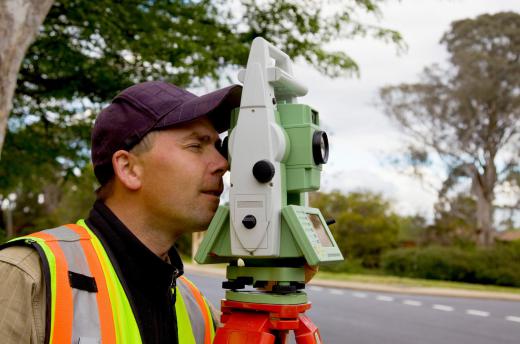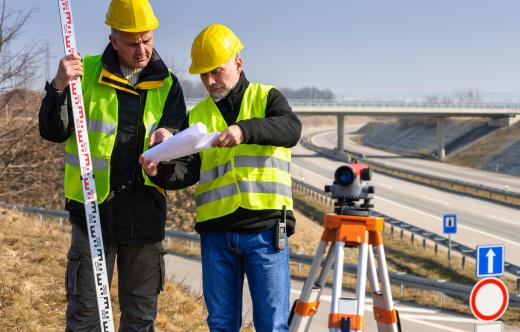Among the many types of land surveyor land equipment, one of, if not the most important, is the theodolite, which has been used and continuously developed since the 1800s. Some other hi-tech equipment includes a Global Positioning System (GPS), data collectors, and satellites. Basic land surveyor equipment, however, is still very useful, such as the compass, level, and the tape measure.
The theodolite can measure both vertical and horizontal angles. Its appearance is very similar to that of a telescope that can twist around in vertical and horizontal directions so it can measure various objects located in different areas. A surveyor would typically look through the theodolite to “lock in” on an object, and the instrument would immediately measure both the vertical and horizontal axes of the object. The theodolite uses the triangulation process so it can measure, for example, the distance between an elevated and a level area. Modern versions may come with technological features such as infrared, lasers, and electronic encoder, all of which can help the land surveyor record accurate measurements.

The GPS and satellites rotating around the Earth are also important pieces of land surveyor equipment, especially in determining boundaries of an area, as well as in documenting any changes in the land. Basically, a land surveyor can install a GPS antenna that transmits broadcast signals to the satellites, which then relay the signal to the GPS receiver carried by the surveyor. This sort of triangular transmission produces accurate data such as the specific coordinates and area of the land. The GPS system permits the land surveyor to have constantly updated data without having to physically travel to the site. Laptops installed with surveying software and the GPS receiver itself act as data collectors, along with other hand-held electronic gadgets.

Modern technology may have supplied a lot of advanced land surveyor equipment, but simple and “non-electronic” tools are still relevant. The tape measure, for example, is very efficient in measuring short distance. The level, consisting of a small amount of liquid inside a tube, can show how flat a plane is, depending on whether or not the air bubble is sitting at the center of the tube. The compass, on the other hand, helps determine the orientation of some objects or the land itself. In fact, almost all modern land surveyor equipment is an evolved version of the more basic instruments, but the main principle behind them remains the same.
